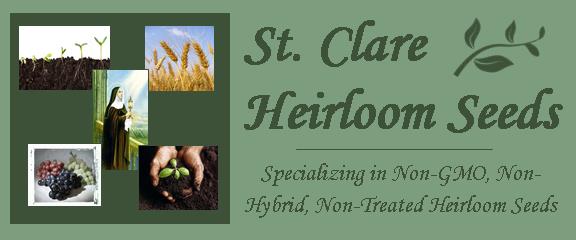Can you give me some ideas on how to best choose seeds for my needs? I’m having trouble choosing from all the variety that’s out there.
First up, should be what will grow in your region/climate. If you have a shorter season, look carefully at the “days to maturity”, if a plant will take too long to grow, your work will be in vain, and your setting yourself up for disappointment, so plant things with the shortest “days to maturity” listed. If you live where it’s hot and humid, look for heat and humidity resistant varieties. If you live where it’s hot and dry, choose heat and drought tolerant varieties… Read More
Why grow heirloom Seeds?
One of the great benefits of growing heirloom / open-pollinated seeds is that they come back “true to type”. In other words, when you save seeds from the mature plants of this year, when you plant them next year thhe resulting plants will produce fruits that tase like, look like, smell like their parent plant’s fruits. Hybrid plants do not have this feature. Hybrid plants will most often revert to a distorted version of one of their parent plants, and will not be the plnat you so liked this year, that is if the seeds aren’t plain sterile…. Read More
Could you please tell me how long can I store my garden seeds? I would like to get them just in case the economy crashes but not necessarily use them right away.
The length of viability of heirloom vegetable garden seeds depends upon the variety, some will only keep a high germination rate for one or two years, others will keep well for ten years, but for either case length of viability and preservation of germination rate can be achieved the longest by freezing seeds (Note: garden seeds must be 8% moisture or below to freeze them)… Read More
What is the best way to store garden seeds?
Freezing will give you the longest storage of seeds, but you do have to make sure that their moisture level is low enough or the seeds will expand and crack and be ruined. Read More
What is the best way to store the worm castings?
For the worm castings the best way to store them will be in the bag we send them in…Read More
If we are unable to plant all the seeds that are included in your packets, can they be saved to use in next years garden? or even the year after?
Yes, if you are unable to use all of your seeds purchased in a given year you can certainly store them. The keys to storing seeds for length of viability are a cool, dark, dry environment. Read More
I live in Florida, what garden seeds would you recommend for my area?
Being from Northern Wisconsin it is hard to know exactly what to tell you on which garden seed varieties will do best for you. From what we’ve heard most varieties will do well in Florida if planted at the right time. Read More
What is the average life of each Heirloom Vegetable Seed?
For a list of how long the average life of each heirloom seed is click here!
Do you sell marijuana seeds?
No we do not sell marijuana seeds!
Why don’t you offer Sweet Potatoes?
We do not offer sweet potatoes or any seed potatoes at this time as we are a small family-owned operation, and are in the stages of growth. Read More
Is there a reason why your seeds are not certified Organic?
As to our reasons for not being organic, we do grow our seeds naturally / organically, but the monetary cost of organic certification and the cost in time of the paperwork are not feasible to a small-time operation. Read More
We’ve had a really hot Spring and Summer here this year, what can we do to cope with the effects of heat on the garden?
Raising vegetables in such extreme heat as this year has brought us more of a challenge than gardening in typical summer weather — both for the gardener and for the vegetables. Apart from planting heat-resistant varieties, there are methods you can take action with, even as temperatures reach the triple digits, to prevent hot-weather problems like wilting, sunscald and blossom drop. Read More
Are there some crops that need watering more often than others?
Cucumbers can turn bitter and radishes get hotter when they don’t receive enough water. Sweet corn and lettuce have more shallow root systems, so they are more sensitive to drought or lack of watering. Read More
Are there general guidelines for when and how much to water?
How often and how much you water depends upon how long ago you planted, what kind of soil you have, the season, the type of plant, and how much rain you have been getting. When a plant is first planted, you want to water well, just after planting, and daily for the next few days. Then you can water more like every 3-5 days. With sandy soil, we find watering really needs to be more frequent, every 2-3 days. Clay soil retains the water more, so you may find you need to water a little less often than the above guidelines. Read More
| “You have not lived a memorable day unless you have done something for someone who can never repay you” |

